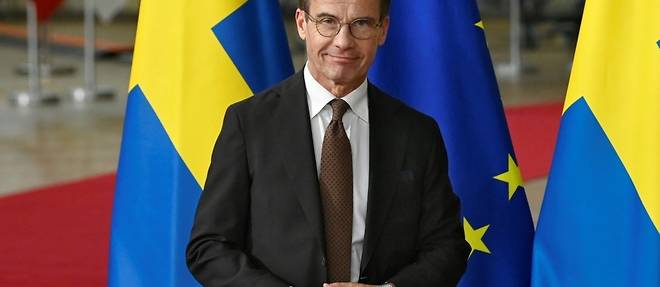Turkish President Recep Tayyip Erdogan receives Swedish Prime Minister Ulf Kristersson on Tuesday in Ankara, eager to advance Stockholm’s NATO membership project, blocked since May by Turkey.
Haloed by the recent success of his mediation with Russian President Vladimir Putin, who finally returned to the agreement on the export of Ukrainian cereals, the Turkish head of state is in a position of strength.
The Secretary General of the Atlantic Alliance, Jens Stoltenberg, however, paved the way for Mr Kristersson by visiting Turkey last week.
“It is time to welcome Sweden and Finland [into] NATO”, launched in Istanbul Mr. Stoltenberg, judging it necessary “to send a clear message to Russia”.
While Turkey has hailed progress in talks since the new Swedish government was formed last month, President Erdogan said on Friday — for the third time in a month — that his parliament would not ratify the two Nordic countries’ membership once certain “measures” have been taken.
Turkey accuses Sweden and Finland of protecting Kurdish fighters from the Kurdistan Workers’ Party (PKK) and the People’s Protection Units (YPG), considered terrorists by Ankara.
She made extradition requests in a memorandum of understanding signed at the end of June between the three countries at the NATO summit in Madrid.
Turkey has since expressed impatience, with Sweden having carried out only one extradition since the beginning of the year, for “fraud”.
In an interview with AFP at the end of October, the new Swedish Foreign Minister Tobias Billström however said he was convinced that Stockholm would be able to “satisfy” the various points of the memorandum, evoking “a positive dialogue” with Ankara.
A sign of Swedish goodwill, Billström said on Saturday that Sweden had to “distance itself” from the YPG — which has been on the front lines of the anti-jihadist fight in Syria, with American support — because their “too strong link” with the PKK, recognized as a terrorist organization by the EU.
“The pressure will rise”
For some analysts, the presidential and legislative elections in Turkey, scheduled for June 2023, may however delay the process.
“The Turkish side will ratify membership when they think it’s the best time to pocket this card. The pressure will undoubtedly mount in the meantime, but it seems that many NATO countries already consider that enlargement will take place next year, or even in the second half of next year,” remarks Ilke Toygür, professor of European geopolitics at Carlos III University in Madrid.
“Also, it is widely believed that Turkey is trying to negotiate other things: it could be the [American fighters] F-16s or its overall relationship with Russia,” Ms Toygür adds.
“Does Erdogan consider that he has received enough signs of goodwill from Sweden and that it is in his political and military interest to declare victory? Or does he prefer to keep the rhetoric to serve his electoral campaign?” asks a European diplomat on condition of anonymity.
For this fine connoisseur of the file, there is however a “reasonable chance” of seeing the Turkish Parliament ratify the accession to NATO of the two Nordic countries before June 2023.

Comments are closed